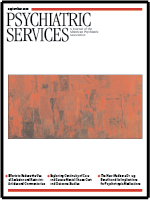Depression and Anxiety Among Mothers Who Bring Their Children to a Pediatric Mental Health Clinic
Abstract
OBJECTIVE: Maternal psychiatric illness is a potent risk factor for child psychiatric disorders, but little is known about rates of psychiatric diagnoses among mothers who bring their children to pediatric mental health clinics. This study investigated rates of psychiatric disorders among mothers of children presenting for psychiatric evaluation and examined the relationship between maternal diagnosis and child psychopathology. METHODS: Interviewers conducted structured diagnostic interviews with nonpsychotic, school-age children and their mothers (N=222) and collected self-report measures of symptoms, functioning, and social support. RESULTS: One-hundred-thirty-five participating mothers (61 percent) met DSM-IV criteria for a current axis I disorder, most commonly depression (35 percent) and anxiety (42 percent). Children of mothers with a diagnosis met criteria for significantly more diagnoses on the Schedule for Affective Disorders and Schizophrenia for School Age Children, Present and Lifetime version and had significantly higher scores on measures of internalizing and externalizing symptoms than children of mothers without a diagnosis. Two-thirds of mothers with a diagnosis were not receiving psychiatric treatment. CONCLUSIONS: More than half the mothers who brought their children for psychiatric treatment were themselves suffering from a psychiatric disorder. Maternal psychiatric illness was, in turn, associated with greater occurrence of psychopathology among offspring, underscoring the importance of developing interventions that address the needs of both children with psychiatric disorders and their at-risk mothers.



